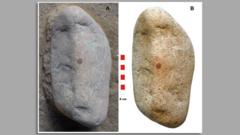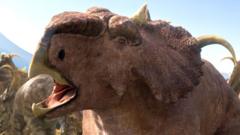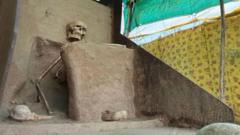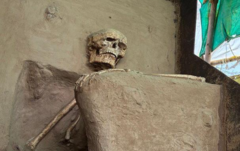Recent archaeological findings at the Charterhouse Warren site in southwest England have unveiled a harrowing tale of violence and cannibalism from the Bronze Age, with at least 37 individuals suspected to have been slaughtered and possibly eaten.
A Shocking Discovery: Bronze Age Mass Grave Reveals Evidence of Cannibalism

A Shocking Discovery: Bronze Age Mass Grave Reveals Evidence of Cannibalism
New research suggests that remains at an ancient grave site in England indicate victims were not only slain but also consumed in a ritualistic act.
The grisly discovery made at the Charterhouse Warren Farm has sent ripples through the archaeological community. A study led by Rick Schulting, a professor of archaeology at Oxford University, brings new light to an old site that had been largely overlooked for decades.
Discovered by cave explorers back in 1970, this mass grave revealed a collection of human remains scattered across a 50-foot ditch, filled with indications of a violent end. Demolished femurs, skulls riddled with blunt force trauma, and bones showing signs of butchery were among the findings.
Schulting and his team conducted an in-depth examination of these bones, leading to unsettling conclusions—these remains belonged to a minimum of 37 people, including men, women, and children. Their examination suggests these individuals were likely killed in a collective act of violence and subsequently consumed in a ceremonial feast.
"It's taken us all aback. It was completely unexpected and totally atypical for the period and for almost all of British prehistory," Schulting remarked on the shocking implications of the study.
Previously accepted as a typical gravesite of Bronze Age victims, further research revealed the site may hold much darker secrets, as evidence indicates these events occurred between 2210 and 2010 B.C.
The initial discovery in 1970 came from cavers, not trained archaeologists, leading to minimal documentation of the find. For decades, the significance of these remains went unnoticed. However, the recent study revitalizes interest in the Charterhouse Warren site, shedding light on the practices of ancient societies and their violent histories.
Schulting's findings not only alter perceptions of this period of British history but emphasize the necessity for continued archaeological exploration to better understand our past. The implications of cannibalism in the Bronze Age, especially in a context of mass violence, call for further investigation into the social dynamics and survival strategies of these ancient populations.
Discovered by cave explorers back in 1970, this mass grave revealed a collection of human remains scattered across a 50-foot ditch, filled with indications of a violent end. Demolished femurs, skulls riddled with blunt force trauma, and bones showing signs of butchery were among the findings.
Schulting and his team conducted an in-depth examination of these bones, leading to unsettling conclusions—these remains belonged to a minimum of 37 people, including men, women, and children. Their examination suggests these individuals were likely killed in a collective act of violence and subsequently consumed in a ceremonial feast.
"It's taken us all aback. It was completely unexpected and totally atypical for the period and for almost all of British prehistory," Schulting remarked on the shocking implications of the study.
Previously accepted as a typical gravesite of Bronze Age victims, further research revealed the site may hold much darker secrets, as evidence indicates these events occurred between 2210 and 2010 B.C.
The initial discovery in 1970 came from cavers, not trained archaeologists, leading to minimal documentation of the find. For decades, the significance of these remains went unnoticed. However, the recent study revitalizes interest in the Charterhouse Warren site, shedding light on the practices of ancient societies and their violent histories.
Schulting's findings not only alter perceptions of this period of British history but emphasize the necessity for continued archaeological exploration to better understand our past. The implications of cannibalism in the Bronze Age, especially in a context of mass violence, call for further investigation into the social dynamics and survival strategies of these ancient populations.




















